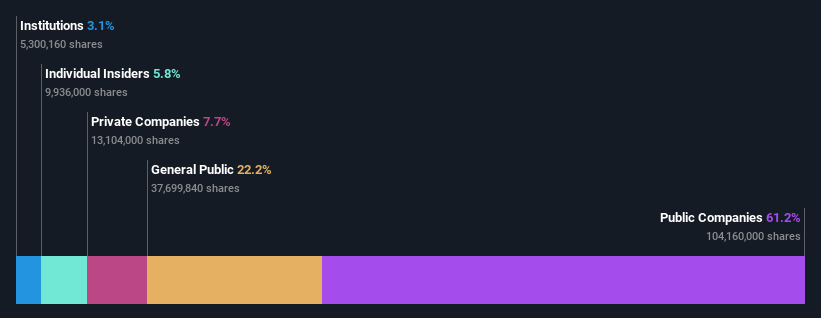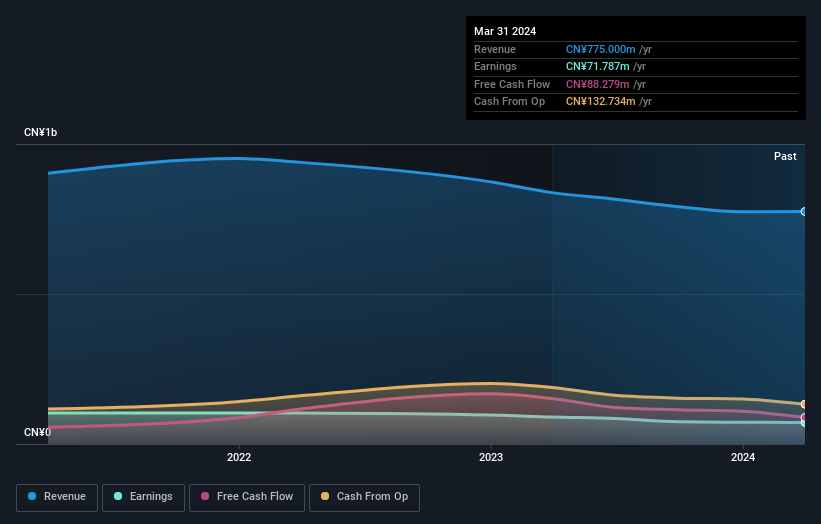- China
- /
- Electronic Equipment and Components
- /
- SZSE:301329
Singatron Electronic (China) Co., Ltd.'s (SZSE:301329) market cap surged CN¥305m last week, public companies who have a lot riding on the company were rewarded

Key Insights
- The considerable ownership by public companies in Singatron Electronic (China) indicates that they collectively have a greater say in management and business strategy
- Singatron Enterprise Co.,Ltd owns 61% of the company
- Past performance of a company along with ownership data serve to give a strong idea about prospects for a business
If you want to know who really controls Singatron Electronic (China) Co., Ltd. (SZSE:301329), then you'll have to look at the makeup of its share registry. With 61% stake, public companies possess the maximum shares in the company. That is, the group stands to benefit the most if the stock rises (or lose the most if there is a downturn).
As a result, public companies were the biggest beneficiaries of last week’s 10% gain.
Let's delve deeper into each type of owner of Singatron Electronic (China), beginning with the chart below.
See our latest analysis for Singatron Electronic (China)

What Does The Institutional Ownership Tell Us About Singatron Electronic (China)?
Institutions typically measure themselves against a benchmark when reporting to their own investors, so they often become more enthusiastic about a stock once it's included in a major index. We would expect most companies to have some institutions on the register, especially if they are growing.
Since institutions own only a small portion of Singatron Electronic (China), many may not have spent much time considering the stock. But it's clear that some have; and they liked it enough to buy in. If the company is growing earnings, that may indicate that it is just beginning to catch the attention of these deep-pocketed investors. It is not uncommon to see a big share price rise if multiple institutional investors are trying to buy into a stock at the same time. So check out the historic earnings trajectory, below, but keep in mind it's the future that counts most.

Singatron Electronic (China) is not owned by hedge funds. Singatron Enterprise Co.,Ltd is currently the largest shareholder, with 61% of shares outstanding. With such a huge stake in the ownership, we infer that they have significant control of the future of the company. With 5.8% and 1.6% of the shares outstanding respectively, Fangjung Liu and WINTIME INVESTMENT HOLDING (HK) CO., LIMITED are the second and third largest shareholders.
Researching institutional ownership is a good way to gauge and filter a stock's expected performance. The same can be achieved by studying analyst sentiments. As far as we can tell there isn't analyst coverage of the company, so it is probably flying under the radar.
Insider Ownership Of Singatron Electronic (China)
The definition of company insiders can be subjective and does vary between jurisdictions. Our data reflects individual insiders, capturing board members at the very least. Management ultimately answers to the board. However, it is not uncommon for managers to be executive board members, especially if they are a founder or the CEO.
I generally consider insider ownership to be a good thing. However, on some occasions it makes it more difficult for other shareholders to hold the board accountable for decisions.
We can report that insiders do own shares in Singatron Electronic (China) Co., Ltd.. It has a market capitalization of just CN¥3.3b, and insiders have CN¥192m worth of shares, in their own names. It is good to see some investment by insiders, but it might be worth checking if those insiders have been buying.
General Public Ownership
The general public-- including retail investors -- own 22% stake in the company, and hence can't easily be ignored. While this size of ownership may not be enough to sway a policy decision in their favour, they can still make a collective impact on company policies.
Private Company Ownership
We can see that Private Companies own 7.7%, of the shares on issue. Private companies may be related parties. Sometimes insiders have an interest in a public company through a holding in a private company, rather than in their own capacity as an individual. While it's hard to draw any broad stroke conclusions, it is worth noting as an area for further research.
Public Company Ownership
It appears to us that public companies own 61% of Singatron Electronic (China). This may be a strategic interest and the two companies may have related business interests. It could be that they have de-merged. This holding is probably worth investigating further.
Next Steps:
I find it very interesting to look at who exactly owns a company. But to truly gain insight, we need to consider other information, too. For example, we've discovered 2 warning signs for Singatron Electronic (China) (1 can't be ignored!) that you should be aware of before investing here.
Of course this may not be the best stock to buy. Therefore, you may wish to see our free collection of interesting prospects boasting favorable financials.
NB: Figures in this article are calculated using data from the last twelve months, which refer to the 12-month period ending on the last date of the month the financial statement is dated. This may not be consistent with full year annual report figures.
New: Manage All Your Stock Portfolios in One Place
We've created the ultimate portfolio companion for stock investors, and it's free.
• Connect an unlimited number of Portfolios and see your total in one currency
• Be alerted to new Warning Signs or Risks via email or mobile
• Track the Fair Value of your stocks
Have feedback on this article? Concerned about the content? Get in touch with us directly. Alternatively, email editorial-team (at) simplywallst.com.
This article by Simply Wall St is general in nature. We provide commentary based on historical data and analyst forecasts only using an unbiased methodology and our articles are not intended to be financial advice. It does not constitute a recommendation to buy or sell any stock, and does not take account of your objectives, or your financial situation. We aim to bring you long-term focused analysis driven by fundamental data. Note that our analysis may not factor in the latest price-sensitive company announcements or qualitative material. Simply Wall St has no position in any stocks mentioned.
Have feedback on this article? Concerned about the content? Get in touch with us directly. Alternatively, email editorial-team@simplywallst.com
About SZSE:301329
Singatron Electronic (China)
Manufactures and sells electronic connectors in China, Taiwan, South Korea, the United States, Canada, and Europe.
Flawless balance sheet second-rate dividend payer.

